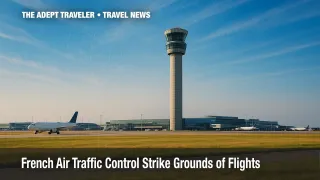French Air Traffic Control Strike Grounds Hundreds of Flights

A fresh French air traffic control strike has hit at the worst possible moment-the first big getaway weekend of summer. Starting Thursday, July 3, two controllers' unions walked off the job over staffing gaps and aging radar equipment, forcing carriers to trim or scrap flights at 11 French airports. Travelers now face rolling delays, re-routings, and abrupt cancellations that could extend into Friday, July 4, compounding Europe-wide congestion just as schools break up. Here is what you need to know, plus how today's walkout differs from the smaller stoppage we reported on June 27.
Key Points
- Why it matters: Walkout coincides with peak summer departures.
- 525 flights canceled, 638 delayed by early afternoon July 3.
- Paris airports cut 25 % - 50 % of movements; regional hubs pare 30 % - 50 %.
- Ryanair scrubs 170 flights, disrupting 30,000 passengers; other carriers follow suit.
- Strike continues July 4; DGAC warns of "significant delays" nationwide.
French Air Traffic Control Strike Snapshot: How It Works
French air traffic controllers belong to the state aviation authority, DGAC, which runs 18 area control centers and towers spanning mainland France and its overseas departments. Under French labor law, unions must file a strike notice five days in advance, allowing DGAC to order "minimum service" levels. On July 3, the authority directed airlines to pre-emptively cancel one quarter of Paris-area departures and as much as half of Friday's schedule, then issued slot restrictions through Eurocontrol. Carriers that cannot meet the reduced allocations must ground or reroute flights, while those still operating can expect extended holding or rerouting around saturated airspace.
French Air Traffic Control Strike Background: Why It Matters
Controller strikes are hardly new-France averages a half-dozen walkouts each year-but 2025 has already logged two major stoppages. The unions UNSA-ICNA and USAC-CGT argue that decades-old radar consoles, patch-worked software, and attrition outpacing hiring jeopardize safety and pile extra workload on remaining staff. DGAC's five-year modernization plan, announced in 2023, is years behind schedule, and a mandatory "clock-in" system slated for 2026 further inflames tensions. Each strike ripples across Europe because 60 % of north-south flights and a third of trans-Atlantic tracks cross French upper airspace, so even travelers who never set foot in France feel the impact.
French Air Traffic Control Strike Latest Developments
The latest two-day protest has already eclipsed past actions in scope and timing.
Early disruption totals
By 2 p.m. local time July 3, flight-tracking platform FlightAware tallied 525 outright cancellations and 638 delays across France. Charles de Gaulle and Orly led the list, yet provincial airports such as Marseille, Lyon, and Toulouse also suffered substantial cuts. Passengers reported queue times exceeding two hours at security, while inbound jets diverted to Brussels, Geneva, and Barcelona to refuel and await fresh slots.
Airline responses
Ryanair axed 170 rotations and warned another 200 could fall if ATC capacity shrinks further on Friday. EasyJet cancelled 274 services, British Airways up-gauged select Heathrow-Paris sectors to wide-body 777s to consolidate loads, and Air France safeguarded most long-haul departures but trimmed short-haul frequency. Low-cost carrier Vueling bused stranded customers from Paris to Bilbao to re-enter less-crowded Spanish airspace.
Official warnings and political fallout
DGAC urged travelers to "postpone journeys where possible" and rebook free of charge. Transport Minister Philippe Tabarot called union demands "unrealistic given the 2025 pay deal already in place," yet pledged to fast-track procurement of new strip-free digital workstations. Industry lobby Airlines for Europe renewed its plea for an EU-wide ATC continuity law to shield overflights during national strikes.
Analysis
For U.S. and other long-haul travelers, the immediate headache is missed connections. If your itinerary touches Paris, Marseille, Nice, or Lyon before Saturday morning, build in at least four extra hours between flights or consider an overnight layover. Passengers whose flights are cancelled qualify for refunds or re-routing under EU261, although cash compensation does not apply because strikes count as "extraordinary circumstances." Airlines often bury rebooking tools in their apps; use them early, then keep boarding passes handy to speed airport security reclears. Rail seats on Eurostar, TGV, and Ouigo trains are selling quickly, so lock those alternatives before arriving at the station. Finally, monitor trans-Atlantic arrivals: New York, Montreal, and Atlanta all logged inbound delays linked to French flow-management restrictions.
Final Thoughts
The French air traffic control strike shows no sign of ending before Saturday. Build margin into your timetable, stay subscribed to airline push alerts, and keep proof of additional expenses for potential reimbursement. If possible, reroute through Amsterdam, Frankfurt, or Madrid until the walkout ends. Savvy travelers who plan ahead, remain flexible, and leverage airline apps will minimize disruption and salvage their summer getaway.
